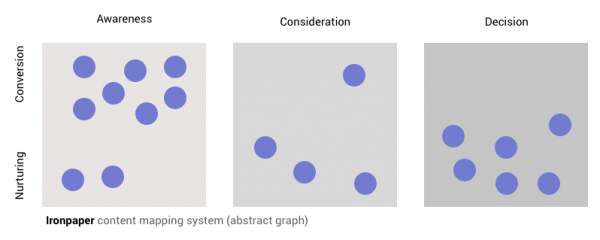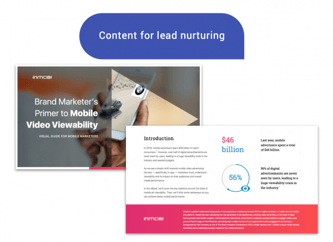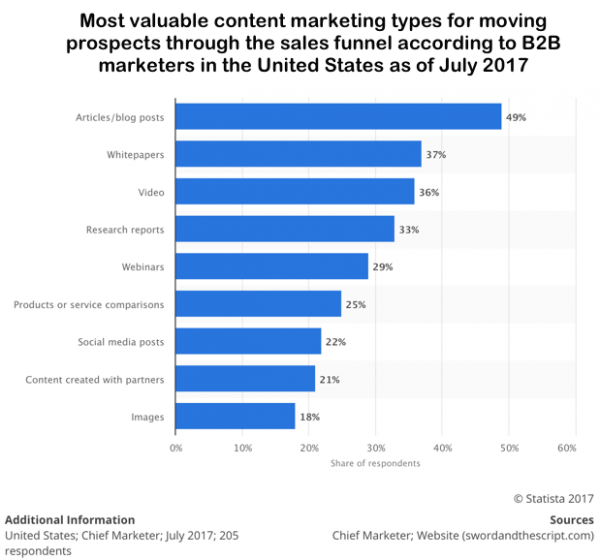
Many organizations invest heavily in lead acquisition but fail to nurture the leads they acquire. What happens often is a prospect will download the content (say an eBook, white paper, infographic, etc.) and then never take an interest in your company or its solutions. They want the content, they get it, and they leave.

But a lot of these leads may fit your ideal buyer persona and could easily become clients if nurtured correctly. Sales teams usually don’t follow up with content leads, because they don’t see them as viable prospects and don’t want to waste their time. (They also would rather spend time acquiring leads through prospecting rather than nurture leads the leads you have.) If the sales team does reach out, they are often too sales-y or pushy, not nurturing. This is a common mistake most organizations make, but one that can be corrected.
50% of leads are qualified but are not immediately ready to buy something from your company (Gleanster Research).
Content leads, typically in the awareness phase, have to be nurtured differently than consideration stage leads, and marketers should play a prominent role in helping push these prospects further down the sales funnel.
Quick nurturing tips:
Marketing and sales teams working together can be a challenge; 64% of companies find it a difficult to foster a sales and marketing alignment (Gleanster Research). Companies that strive to create a cohesive working relationship between these two teams, however, will find themselves with many more prospects moving down the sales funnel. Here are solutions for teams that are ready to nurture content leads.

Content mapping is a key strategy to nurturing content leads and relies on the idea of matching content to where the prospect is in the buyer’s journey. It organizes ‘who gets what content and when.’ Most likely the sales team already has the buyer’s journey arranged, so the marketing team can take a look and decide what content belongs where. Businesses should think about what logical steps a prospect would take along the sales funnel and what materials will be useful at each stage.
Sales and marketing teams should constantly ask themselves: What valuable content or tools can be used to push the prospect to take the next step? Additionally, what content or tools will be useful to the prospect? The content along the buyer’s journey must always add value to the prospect and not simply push sales, as that will turn the prospect off to the company. Businesses often find content in the middle-of-the-funnel or at the bottom-of-the-funnel most challenging, so read our guides on how to master each of these stages.
Guides on content marketing:
As mentioned, content along the sales funnel should provide value to the prospect. Additionally, the content should indirectly demonstrate the value of the company or its thought leadership. An example could be sharing an article by the CEO or founder of the company that was placed in a third-party publication; this shows the piece’s authority and that the writer is an expert in the field. Other examples of this type of content could be webinars, podcasts, courses, eBooks, or guides specific to a certain industry.

If you ask a prospect to perform too many steps before accessing content, they might just click off your website. Instead, create easy-to-access content teasers that offer solutions, demos, pain point understanding, or value propositions. If a prospect reads your blog post, instead of asking them to buy your product right away, offer a downloadable infographic of the content that they just read and only ask them for their email. You can also offer them research reports or to sign up for an email series that discusses similar topics. Lastly, video is a strong performer.
Pro tip: Record a video that acts as an authentic education piece related to the content they downloaded.

64% of companies find it a difficult to foster a sales and marketing alignment (Gleanster Research).

Companies can often go wrong by putting too much of their content behind a gate (i.e., to access initial content, prospects must immediately put in their email). This may be good for lead acquisition, but this is not the way to move them down the sales funnel. Instead, create value-add, ungated sales nurturing content that speaks directly to a prospect's pain points. What challenges does the prospect need to address? Think about that and write content that directly speaks to it. Then, allow the prospect to access the content easily.

Leads nurtured with targeted content produce an increase in sales opportunities of more than 20% (Kula Partners), so it’s important not to dismiss these prospects. If sales and marketing teams work together to map out what content works at which part of the sales funnel, more leads can be pushed down the funnel to become clients.
Sources
https://images.msgapp.com/uploads/95603/LicensedGleansights_comp7564jvl493sa/Gleansight%20-%20Lead%20Nurturing%20-%20Q42010%20-%20Licensed.pdf
https://kulapartners.com/resources/inbound-marketing-strategy/
by Jonathan Franchell, CEO of Ironpaper - For more tips and hacks: Need to remove a new line after h1 tags? Both web designers and SEO practitioners need to employ headline tags: H1, H2, H3 in several ways to improve web page structure and tag...

The Crowded Arena of the IT Marketplace Updated December 2024 The Information Technology (IT) landscape is experiencing rapid growth and intensifying competition. IT spending is projected to reach nearly 5.1 trillion U.S. dollars in 2024, a...

Updated December, 2024 The field of digital marketing is evolving rapidly in response to new technology and changing buyer expectations. To help career-minded marketers, we’ve rounded up the top 10 skills needed to succeed in the field. These are...

The marketing industry is transforming significantly due to generative AI and increasing market complexity. Gartner's prediction of a 25% decline in traditional search traffic suggests that the era of search engines is dying. AI tools, particularly...
